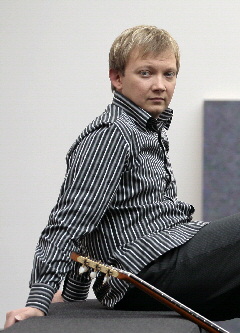
Deutsch

| Ukraine-born Roman Viazovskiy presents an exceptionally well filled
disc, with five sonatas – none overperformed, and two receiving
their premiere recording. Viazovskiy is entirely in command of these works technically. Musically, too, he is at home with their stylistic variety. The Berkeley Sonatina has a limpid clarity which not all players manage. Viazovskiy’s intelligent phrasing enables the musical logic to emerge clearly in the first movement. The Rodrigo Sonata Giocosa and Castelnuovo-Tedesco Sonata are equally well handled. In particular, Viazovskiy brings great sprightliness to the first movement of the Castelnuovo-Tedesco. The two pieces by Vassiliev are new to disc. The Sonata-Fantasy is a four-movement work inspired by Shakespeare’s Romeo and Juliet. The third movement, "The Fight", is particularly impressive – dynamic and menacing. The other movements are less focused and not so clearly characterised. Vassiliev’s three-movement Sonata, however, is more successful, and formally more adventurous. It deserves to be taken up by more players. A Scherzo opens the work, followed by a slow Passacaglia with a processional feel. The final movement is a tour de force for both composer and performer. It is based on a few motifs that undergo ingenious transformations, including at one point a lyrical slow interlude. Vassiliev shows he can create an extended movement by unpacking the possibilities of small amount of musical material, instead of having to introduce new themes. This fine disc is an excellent introduction both to Viazovskiy and to some excellent music. Allan Clive Jones He [Roman Viazovskiy] achieved something few people can achieve – an almost perfect harmony of emotion (and believe me, there was a lot of it at the concert) and control over the technical difficulty of such pieces as Sonata Giocosa (Rodrigo) and Koshkin’s Introduction and Vivace. He built up incredible suspense in a masterly way, and riveted the audience’s attention with every note of his guitar. A revelation. Krzysztof Pelech From the outset Viazovskiy leaves one in no doubt that there is a player to be reckoned with: his phenomenal technical virtuosity and first-rate musicianship raising the standard of interpretation of this music on a level with the best of them. He has the luxury of having the whole gamut of emotions in his playing, being able to call on demand such delicacy and tenderness when needed, as in the delightful Pavana from Antonio José's Sonata and Brouwers's Cancion de Cuna and aggression and impassioned energy as in both Sonatas from the same two composers. The undoubted highlight for this reviewer are the two works by Konstantin Vassiliev, due, no doubt, partly in their unfamiliarity but also for the skilful way the composer has woven into what amounts to around eighteen minutes worth of solo guitar music such a rich tapestry of emotions. This is wonderful writing for the instrument - some of the best of modern times. After all the fireworks, Viazovskiy choses to end the programme with the stunningly beautiful Egberto Gismonti work Agua e Vinho and leaves in a whisper. Certainly Fatum is one the best recordings I have reviewed over recent years, the playing is immaculate, the programme has no low points, what more could one ask for? Steve Marsh With his first CD the young ukrainian guitarist already lets us discover his new performance, that shows a breath of vivid liveliness, like the russian composer Konstantin Vassiliev. “Fatum” is a sequence of instrumental movements, the theme presenting his native land. “Three forest paintings” gives honour to the guitar in three varying levels, which are not without greatness and brilliancy, offering the smoothness of Bukolik onwards to devillishly frantic dance. The “Sonata” (1933), from the spanish composer Antonio
Josè, the friend of Lorca, who was also shot very young, is the
work of a young composer who was predicted (through Ravel) , to have
a great future, but at the age of 35 it was all over. Thanks to this
young concert guitarist, “Les Cahiers de la Guitare”, No. 84/2002 |